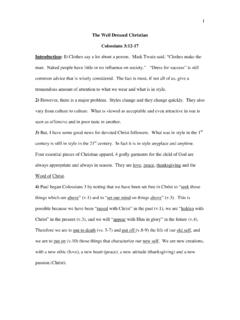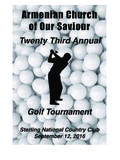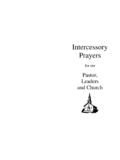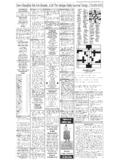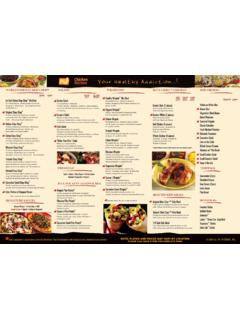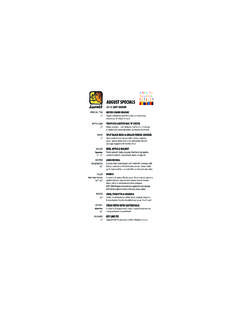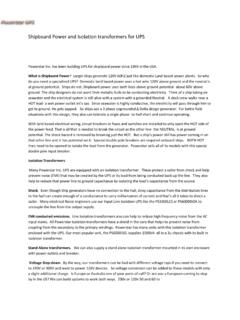Transcription of Here Comes Our King (The Triumphal Entry of …
1 1 Here Comes Our king (The Triumphal Entry of Jesus) Mark 11:1-11 Introduction: 1) Steve Lambert is a Christian brother who lives in Washington, and is a member of Capitol Hill Baptist Church where my friend Mark Dever is the pastor. Reflecting on the differences between Christianity and Islam he provides a most interesting perspective and contrast between the two when he writes, In no other manner are the differences between Muslims and Christians more sharply contrasted than in the difference between the characters and legacies of their prophets. Perhaps the contrast is best symbolized by the way Mohammad entered Mecca and Jesus entered Jerusalem. Mohammad rode into Mecca on a warhorse, surrounded by 400 mounted men and 10,000 foot soldiers.
2 Those who greeted him were absorbed into his movement; those who resisted him were vanquished, killed, or enslaved. Mohammad conquered Mecca, and took control as its new religious, political, and military leader. Today, in the Topkapi Palace in Istanbul, Turkey, Mohommad s purported sword is proudly on display .. Jesus entered Jerusalem on a donkey, accompanied by his 12 disciples. He was welcomed and greeted by people waving palm fronds a traditional sign of peace. Jesus wept over Jerusalem because the Jews mistook him for an earthly, secular king who was to free them from the yoke of Rome, whereas, Jesus came to establish a much different, heavenly kingdom. Jesus came by invitation and not by force. (Quoted in Mark Dever, It Is Well, (Wheaton: Crossway, 65).)
3 2) Mark 11 begins the last chapter in our Lord s earthly life. Chapters 11-16 record the final week of that life. Mark devotes more than 1/3 of his gospel to passion week. Some have referred to Mark s gospel as a passion narrative with an extended introduction. That is not a bad description. It will be a busy and active week culminating in his death on the cross and His glorious resurrection. 2 3) It begins with his arrival in Jerusalem during Passover. Traditionally we call it the Triumphal Entry . It is a clear and unambiguous declaration of His Kingship. So important is the event it is recorded in all 4 gospels (Matt 21; Mk 11; Luke 19; John 12). With His arrival the die is cast! There will be no turning back. The Lamb who was slain before the foundation of the world (1 Pet 1:20) will now be slain in space and time.
4 The atonement for sin ordained in eternity past now becomes historical for all to behold. 4) Jerusalem would be a buzz with activity. During Passover the population could swell to 3 times its normal size as pilgrims from all over the world descended (better ascended ) upon it. However, this Passover would be unlike any other had or ever would be. As Paul would write in 1 Cor 5:7, For Christ, our Passover lamb, has been sacrificed. So, in light of all this, how should we respond to the coming of our king ? I. Worship the One who is always in control. 11:1-3 Jesus and the disciples, as they drew near to Jerusalem, came to Bethphage ( house of unripe figs ) near Bethany on the Mount of Olives (v. 1). Bethany was the home of Mary, Martha and Lazarus whom Jesus raised from the dead (John 11:38-44).
5 It will be the place where Jesus will stay during the final week of His life (Mk 11:11). Our Lord then dispatched 2 unnamed disciples to a local village telling them as they entered they would find an un-ridden colt tied up upon which no one had ever sat. Untie it and bring it (vs. 1-2). How did He know all this?! If that is not unusual enough, He instructs them further in v. 3 (read). Note the repetition of the word immediately. Note also it is the Lord (kurios) who has need of it (v. 3). As the Ark of the Covenant needed an unyoked carrier (1 Sam 6:7; cf. 3 Num 19:2; Deut 21:3), so the true Ark of the Covenant, the Lord Jesus, required an unridden animal for this sacred assignment. It is bringing the Holy One into Jerusalem.
6 All of this is carefully laid out by the Lord who has planned everything out to the last detail and is in complete control. From the moment He enters Jerusalem the prerogatives of deity are present. Jesus is Lord and Master of every detail of His divine destiny. He knows what will happen and when it will happen. It will all go according to plan. Sinclair Ferguson is spot on, His majesty and authority began to shine through from the moment of his Entry into Jerusalem (Let s Study Mark, 180). We should also take note, without running past it too quickly, of the importance of the Mount of Olives (v. 1) in biblical and redemptive history. The Mount of Olives is a ridge about two and a half miles long. It rises to a height about 2700 feet, 200 feet higher than Mount Zion.
7 The view from its summit is breath-taking. Its crest is less than a mile directly east of Jerusalem. It is known for its many olive trees. Significant historical events: 1) Its slopes were the path of David s retreat from Jerusalem to escape capture by Absalom (2 Sam 15:30-32). 2) On this mount Solomon grieved God by erecting idols for his foreign wives to worship (1 Kings 11:1-10). 3) On this mount Jesus wept over the disobedience and blindness of Jerusalem (Lk 19:41-44). 4) Ezekiel witnessed the Glory of God on the Mount of Olives (Eze. 11:23). 4 5) Jesus, the Son of David made his royal Entry into Jerusalem from here. (Mk 11:1-10; Luke 19:28-40; Matt 21:1-10; John 12:12-13). 6) The disciples witnessed Jesus ascension into glory on this mount (Lk 24:50-51; Acts 1:9-12).
8 7) In Acts 1:10-11 Jesus said He would come again in the same way you have watched him go. Zechariah 14:4-5 tells us what will happen when those holy feet touch down once again where He left, On that day his feet shall stand on the Mount of Olives that lies before Jerusalem on the east, and the Mount of Olives shall be split in two from east to west by a very wide valley, so that one half of the Mount shall move northward, and the other half southward. And you shall flee to the valley of my mountains, for the valley of the mountains shall reach to Azal. And you shall flee as you fled from the earthquake in the days of Uzziah king of Judah. Then the Lord my God will come , and all the holy ones with him. Transition: We should worship the One who is always in control.
9 II. Worship the one who submits to the Word of God. 11:4-7 (cf. Zech 9:9ff; Matt 21:4- 5; John 12:14-15) The two disciples go and 1) find things as Jesus said and 2) did as Jesus said (v. 4). As they were warned, some of those standing there said to them, What are you doing untying the colt? (v. 5) They responded and told them what Jesus had said. (v. 6). The response was quick and to the point: and they let them go. (v. 6). In vintage Markan simplicity we are told in v. 7 that: 1) they brought the colt to Jesus, 2) threw their cloaks on it (for Him to sit on) and 3) Jesus sat on it to ride into Jerusalem. Oh, there is so much here between the lines! 5 Jesus has walked everywhere else in His ministry throughout Israel except for those occasions when He was riding in a boat.
10 Now for the one and only time He rides an animal, a small colt. Matthew 21:7 more fully informs us it was a donkey and that it was accompanied by its mother. All of this is highly symbolic in light of Old Testament prophecy, expectations and allusions! The phrase The Lord has need of it is the exact same phrase used in Mark 2:25 to justify David s eating the bread of the Presence when he and his men were hungry. David s greater S on is here! His riding in on a donkey also is a declaration of His kingship and a fulfillment of Zechariah 9:9 as Matthew 21:4-5 and John 12:14-15 make clear. In fact listen to Zechariah 9:9-17 which, as is often the case with Old Testament prophecy, does not make a clear distinction between our Lord s first and second coming.

